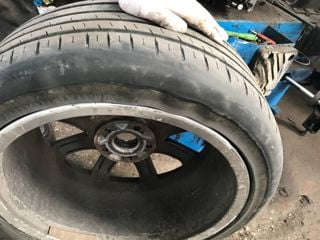Tyre choice
"Obtaining the best value is a priority for most fleets," according to Simon Tattersall, head of national fleets at ATS Euromaster. "But don’t automatically assume a budget or mid-range policy will achieve this.
"Provided a vehicle isn’t about to be taken off the fleet, a premium brand tyre could well deliver the lowest total cost of ownership, contributing to reduced running costs over the contract duration."
This reflects the thinking of most leasing companies and fleet managers, who prefer premium brand tyres for their vehicles.
One reasons for this is confidence in the brand, but there are other reasons such as the leasing company insisting on sticking with a premium make, if not necessarily a single manufacturer.
While fitting one make of premium brand tyre to a vehicle already fitted with another brand’s tyres does not pose a risk to the car’s braking and cornering performance, or its fuel economy or emissions, there is evidence that lower quality tyres can have an effect.
This is due to some non-premium brand tyres having a higher rolling resistance. To know which tyres match those already fitted to the car, you can use tyre labelling as a way of comparing tyres.
Swapping a tyre for a direct replacement is the ideal solution to a worn or damaged tyre, but it’s not always possible to find a like-for-like new tyre.
Steve Chandler, SMR supplier network manager at Lex Autolease says: "Strict like-for-like tyre replacement policies are of little benefit unless a business is running a fleet of high-performance vehicles. There are some 12,000 tyre sizes and specifications in current use – no single site can come close to stocking all of them. Consequently stock profile tends to reflect what sells at that particular site.
"Adopting a like-for-like policy is possible, but this can have an impact on downtime as tyres have to be ordered in more frequently. A 'premium fit' policy allows the service provider to select from an agreed list of premium tyres.
"For vans, eliminating downtime almost always takes precedence over like-for-like replacement and a preference for a specific manufacturer."
This is where tyre labelling helps out the fleet manager looking at replacement tyres. There are three areas covered by tyre labelling, encompassing noise levels, fuel efficiency and wet weather grip.
It’s the latter two of these that will concern most fleets looking to improve their tyre policy.
However, while tyre labelling gives fleets a base point from which to start making a choice, labelling is not considered comprehensive enough by most in the tyre and leasing industries for fleets to make a fully informed selection.
David Howe, fleet service manager at HiQ, says: "Some fleets use tyre labelling as a key indicator, but many use other criteria and you have to look at all of the key performance indicators to have a complete idea."
Peter Bonney from the Salvation Army is more blunt. He says: "I’ve not noticed a shift in attitude since the introduction of tyre labelling. It comes down to cost."
One reason for the slow adoption of tyre labelling among fleets as a measure when choosing tyres is because most fleets already have a tyre policy that dictates premium brand products are fitted to all of their vehicles.
Due to this, any new tyre will already meet the same or higher standards than the tyre being replaced, so it’s felt there is no need to investigate the choice further.
Malcolm Roberts, of Hitachi Capital Vehicle Solutions, adds: "Tyre labelling has not influenced our policy. It has had minimal impact as general awareness at driver levels doesn’t appear particularly high. Also, labelling doesn’t provide the whole picture, with aspects such as dry weather performance and longevity ignored."
Peter Lambert develops this idea: "Tyre longevity is hugely important for fleet operators from a cost viewpoint. Also, 70% of road collisions occur in dry weather. So, until the list of attributes reported via tyre labelling is increased beyond the current three criteria and includes longevity and dry grip, the status quo will remain."




















Bob the Engineer - 31/10/2014 08:04
2mm is dangerous any high mileage driver knows this. But its legal so fulfills the true aim of most fleets duty of care, backside covering for seniors. The weather is changing, sudden and severe rainfall is more frequent (look at all the flooding in recent years) meaning drivers frequently, suddenly faced with roads covered in standing water. I really think the legal minimum should be raised to 2.2mm to force fleets to act responsibly by changing below 2.5.